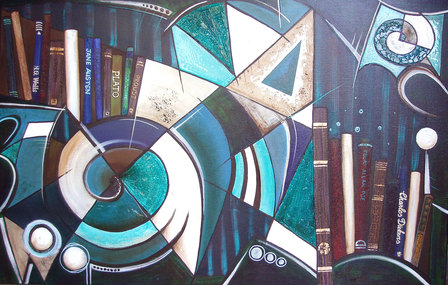Philosophy of Literature: Abstract NZ Art
This is Philosophy of Literature but in abstract art.
Come dive deep into the mesmerising world of Collette's artistry, where she takes you on an exhilarating journey of mixed media and textures. With a bold abstract approach, Collette's art masterpiece incorporates the fusion of pumice and resin with artists quality gels and pastes, creating an astounding contrast of extremes.
Collette's love for books and passion for reading shines through in this remarkable piece. Every inch of this artwork reflects her admiration for classic literature, featuring iconic authors such as Shakespeare, Plato, and Edgar Allan Poe, to name just a few.
This magnificent piece measures 1200mm x 750mm x 20mm deep, making it a captivating addition to any space. Collette, a contemporary New Zealand artist, truly outdoes herself with this breathtaking creation.
This artwork may be sold, but you can commission a similar piece by talking directly to the artist. Contact us now.
Or if you're looking to buy modern art online, explore the available artworks in Collette's online art galleries.
Exploring the Timeless Beauty of Classical Literature
Classical literature stands as a testament to the enduring power of storytelling and its profound impact on individuals and societies. From ancient epics to philosophical treatises, classical literature encompasses a rich tapestry of works that have withstood the test of time.
In this article, we embark on a journey to unravel the essence of classical literature, delving into its defining characteristics, its significance throughout history, and the timeless themes that resonate with readers today.
Defining Classical Literature:
At its core, classical literature refers to the enduring literary works of ancient civilisations and subsequent periods that exhibit artistic excellence, intellectual depth, and cultural significance. These timeless texts are revered for their universal themes, masterful storytelling, and enduring generational relevance.
Classical literature spans a wide range of genres, including epic poetry, drama, philosophy, and historical narratives, reflecting humanity's diverse intellectual and creative achievements.
Timeless Themes and Universal Appeal:
Classical literature explores themes that transcend time and culture, illuminating fundamental aspects of the human condition. These works delve into the complexities of love, honour, morality, power, and the eternal quest for meaning.
From Homer's "Iliad" and "Odyssey," which delve into heroism, fate, and the consequences of war, to Shakespeare's plays like "Hamlet" and "Macbeth," which explore the intricacies of human nature and the timeless dilemmas of conscience, classical literature continues to captivate readers with its profound insights into the human experience.
Historical Significance and Cultural Influence:
Classical literature played a pivotal role in shaping civilisations' cultural, intellectual, and social landscape throughout history. The works of ancient Greek and Roman writers, such as Plato, Aristotle, Virgil, and Ovid, laid the foundations of Western thought and influenced subsequent literary movements and philosophical discourse.
Moreover, these texts became touchstones for successive generations of writers, serving as sources of inspiration and intellectual stimulation.
Literary Techniques and Artistry:
Classical literature exhibits exceptional craftsmanship and literary techniques that have become archetypes for storytelling. From the use of vivid imagery and symbolism to the skilful manipulation of language and rhythm, these works showcase the artistry and mastery of their creators.
In addition, the meticulous attention to detail, complex character development, and intricate plot structures found in classical literature continue to inspire and inform contemporary writers and readers alike.
Permanence and Enduring Relevance:
What sets classical literature apart is its ability to transcend the limitations of time and space. These works speak to the human experience in profound ways, offering insights and perspectives that remain pertinent across centuries.
The exploration of universal themes and the presentation of moral dilemmas allow readers to connect with characters and situations from vastly different historical contexts. Through classical literature, we gain a deeper understanding of ourselves, our shared history, and the timeless questions that confront us as human beings.
Preserving the Legacy:
Engaging with classical literature is paramount in preserving our cultural heritage and intellectual legacy. By studying and appreciating these works, we foster a sense of connection to our shared past, expand our knowledge of different civilisations, and nurture a deeper appreciation for the power of language and storytelling.
Moreover, classical literature provides a platform for critical thinking, cultural dialogue, and exploring diverse perspectives.
In Retrospect:
Classical literature stands as an enduring testament to the indelible impact of storytelling and the power of words to transcend time and space. From ancient epics to philosophical treatises, these works continue to captivate readers with their universal themes, profound insights, and timeless relevance.
Exploring classical literature allows us to delve into the depths of human experience, challenge our assumptions, and connect with the collective wisdom of generations past.
